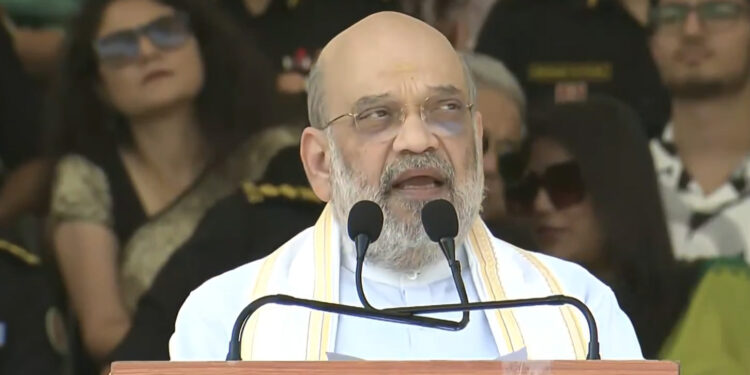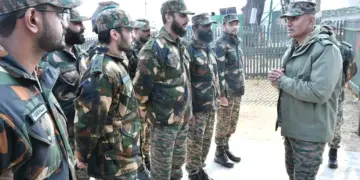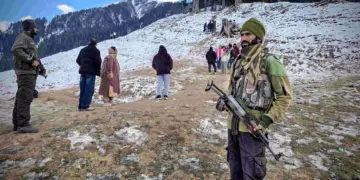Manesar: Operation Sindoor ensured the devastation of headquarters, training centres and launchpads of terrorist groups in Pakistan, Union Home Minister Amit Shah said on Tuesday, asserting that no place is safe for terrorists anymore.
Addressing the 41st Raising Day of the anti-terror ‘Black Cat’ commando force National Security Guard (NSG) at its headquarters here, Shah also said the Indian security forces are resolutely determined to go to the depths of the Earth to punish every act of terror.
“Operation Sindoor has ensured the devastation of Pakistani terror headquarters, their training centres and launchpads… In Operation Mahadev, our security forces carried out precise action to eliminate the terrorists who carried out the terror attack in Pahalgam. It has further strengthened the confidence of the citizens in the security forces,” he said.
Under Operation Sindoor, the Indian defence forces targeted terror infrastructure and defence installations in Pakistan in May, following an attack in Jammu and Kashmir’s Pahalgam on April 22, which claimed 26 lives.
The home minister said that under Prime Minister Narendra Modi’s leadership, the government has adopted a zero-tolerance policy against terrorism.
“If one analyses the government’s campaign against terrorists carefully, from abolishing Article 370 (which gave special status to Jammu and Kashmir) to surgical strike, air strike and Operation Sindoor, it will become clear that the security forces have hit at the very roots of terrorists and terror groups,” Shah said.
“No matter where terrorists hide, our security forces have proven that no place is safe for terrorists anymore. Our soldiers are resolutely determined to go to the depths of the Earth to punish every act of terror,” he said.
Since 2019, he said, the central government has taken a number of steps to protect the country from terror threats.
These include amendments to Unlawful Activities (Prevention) Act and National Investigation Agency Act, besides actively pursuing cases registered under the Prevention of Money Laundering Act by the Enforcement Directorate to investigate the funding of terror groups, he added.
Shah said the government has also established a system for scientific investigation of terror funding, banned the terror group Popular Front of India, and strengthened the Multi Agency Centre for gathering and sharing intelligence inputs on terror groups across the country.
“For the first time, we have defined terrorism in the new criminal laws and filled the gaps previously found in the courts. So far, we have declared more than 57 individuals and numerous organisations as unlawful,” he said.
Over the years, he said, the NSG has fought a very significant battle against organised crime and terrorism in the country.
The NSG has protected the nation with its bravery in several serious attacks since 1984. These include Operation Ashwamedh, Operation Vajra Shakti and Operation Dhangu Suraksha, he said.
“Seeing the bravery of the NSG, every citizen of the country feels that the security of the nation is in very safe hands. The entire country takes pride in the bravery of the NSG. I extend my very best wishes to NSG soldiers for this,” Shah said.
The NSG is a federal contingency force under the Union home ministry. It was raised in 1984 and its ‘Black Cat’ commandos are tasked with specific counter-terrorist and counter-hijack operations, apart from protecting high-risk VIPs.
Shah said the government is going to set up a hub of the NSG — the sixth of the force — in the temple town of Ayodhya in Uttar Pradesh.
The five existing NSG hubs are Mumbai, Chennai, Kolkata, Hyderabad and Gandhinagar.
The home minister also laid the foundation stone of a special operation training centre of the NSG which will be constructed at a cost of Rs 141 crore in an area spanning 8 acres.
This state-of-the-art training centre will not only be for the NSG, but will also train personnel of anti-terrorist squads from across the country. This will further strengthen the country’s fight against terrorism, Shah said.
Operation Sindoor 2.0 will be deadlier, says Western Army Commander Lt Gen Katiyar
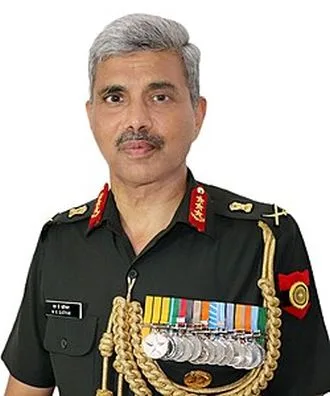 Asserting that Pakistan has no capacity to fight India but it may attempt Pahalgam-type attacks again, Western Army commander Lieutenant General Manoj Kumar Katiyar on Tuesday said the response — Operation Sindoor 2.0 — will be deadlier.
Asserting that Pakistan has no capacity to fight India but it may attempt Pahalgam-type attacks again, Western Army commander Lieutenant General Manoj Kumar Katiyar on Tuesday said the response — Operation Sindoor 2.0 — will be deadlier.
He maintained that Pakistan continues its policy of “bleed India through a thousand cuts” and said the Army is fully prepared to deal with it.
“The action we will take this time will be deadlier than the past. It would be more powerful. Yes, you are very right. It (Operation Sindoor 2.0) has to be deadlier. There is no doubt about it,” Lt Gen Katiyar told reporters.
He was replying to a question whether Operation Sindoor 2.0 will be deadlier than the first one.
Asked whether there will be Pahalgam-type attacks in the future by Pakistan, he said that until there is a change in Pakistan’s thinking, it will continue to carry out such mischiefs.
“It does not have the capacity to fight a war with us. They do not want to fight a war. It does mischief as per its policy of ‘bleed India through a thousand cuts’.”
The Western Army commander said that India had inflicted heavy damages on Pakistan in Operation Sindoor. “We have destroyed its posts and air bases, but it may again attempt something (Pahalgam-type attack). We have to remain prepared. We are fully prepared. I am confident the action this time will be deadlier than in the past,” he said.
Earlier, during his address to ex-servicemen, he said Pakistan may try to attack again like it did in Pahalgam. “They do not have the courage to face us directly. Pakistan will not desist from its designs. But the Indian Army is ready to foil it. For that we need support from the people, particularly veterans. We are hopeful that veterans will support us,” he said.
Pak’s losses of soldiers along LoC during Operation Sindoor over 100: DGMO Lt Gen Ghai
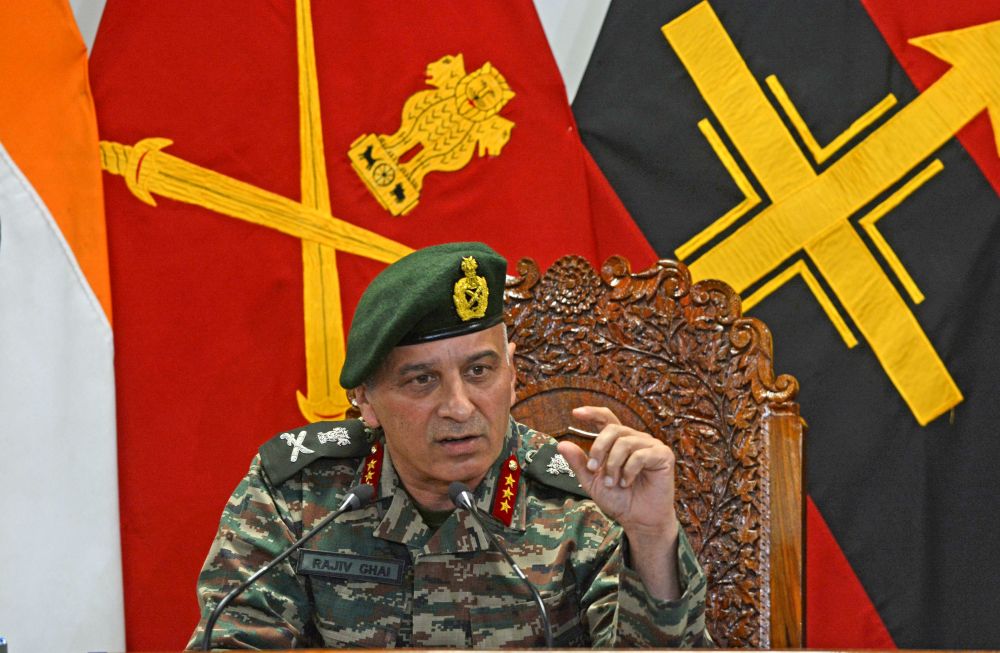 Pakistan is understood to have lost over 100 military personnel along the Line of Control during Operation Sindoor, Indian Army’s Director General Military Operations Lt Gen Rajiv Ghai said on Tuesday, citing list of awards conferred posthumously by that country’s military.
Pakistan is understood to have lost over 100 military personnel along the Line of Control during Operation Sindoor, Indian Army’s Director General Military Operations Lt Gen Rajiv Ghai said on Tuesday, citing list of awards conferred posthumously by that country’s military.
The top military official also said that Pakistan lost at least 12 aircraft during the conflict in May while echoing the details shared by Chief of Air Staff Air Chief Marshal A P Singh a few days ago.
Lt Gen Ghai also said that the Indian Navy was fully ready to play its part and if Pakistan had decided to continue with the hostilities any further, it could have been “catastrophic for it, not only from the sea but from other dimensions as well”.
Sharing certain details of the May 7-10 hostilities, Lt Gen Ghai said Pakistan had resorted to cross-border firing immediately after India pounded nine terror targets on May 7.
“Pakistanis possibly unwittingly let out their awards list last month on the 14th of August, and the number of posthumous awards that they awarded suggests to us now that their casualties on the LoC were also in excess of 100.
“We went after terrorists, and once that had been achieved, it wasn’t our intention to escalate it unless compelled to do so. There was also cross-border firing by Pakistan immediately once the terror targets were engaged,” he said.
“Pakistanis possibly unwittingly let out their awards list on August 14, and the number of posthumous awards that they awarded suggests to us now that their casualties on the LoC were also in excess of 100,” Lt Gen Ghai said.
The Director General Military Operations (DGMO) even said Pakistan’s drone attacks against India was a “dismal failure”.
He said Pakistan sent drones even after the two DGMOs had spoken.
“A variety and class of drones were utilised in an attempt to cause casualties and damage to (our) men and material. But everything was a dismal failure,” he said.
The attacks, he said, led to the Indian Air Force’s precision strikes on Pakistan installations on the intervening night of May 9 and 10.
“We hit 11 of their air bases. If you see, eight air bases, three hangars and four radars were damaged. Pakistani air assets were destroyed on the ground as well,” he said.
Lt Gen Ghai said the Pakistani losses on the ground included one C-130 class of aircraft and one AEW&C (Airborne Early Warning & Control), four to five fighter jets.
He said Pakistan also suffered losses in the air.
“We now know that the world’s longest ever ground-to-air kill was at 300 kilometres plus and five high-tech fighters (were hit). I think the impunity with which these attacks were carried out is what is significant,” he said.
In response to the Pahalgam terror attack, India launched Operation Sindoor on May 7, targeting terrorist infrastructure in territories controlled by Pakistan.
The strikes triggered four days of intense clashes that ended with an understanding on stopping the military actions on May 10.
Lt Gen Ghai also mentioned killing of the three terrorists in June who carried out the Pahalgam attack, adding the Army was determined to “chase them to the depths of hell and we did”.
“It took us 96 days but we did not let them rest,” he said.
“When these three terrorists were found and eliminated clinically, it seemed as if they were exhausted from running, and they also seemed very malnourished,” he said.
“Often, people can turn around and tell you where they have vanished. But it is at times, like searching for a needle in a haystack. While it may seem very simple to the non discerning, these things take time,” he said.
Lt Gen Ghai said there has been a “doctrinal shift in our strategy against terror”.
“Our prime minister has spoken about it. And these are the three things he said. The terror attacks are an act of war. Therefore there will be decisive retaliation. We will not succumb to nuclear blackmail. And there is no distinction between terrorists and sponsors of terrorism,” he said.

